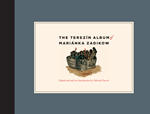The power of a few plain jottings
 A few days ago the New York Sun‘s staff reporter Adam Kirsch reviewed The Terezín Album of Mariánka Zadikow:
A few days ago the New York Sun‘s staff reporter Adam Kirsch reviewed The Terezín Album of Mariánka Zadikow:
The book itself could not be more ordinary: It is a high-quality facsimile, with translations, of an autograph album belonging to a teenage girl. As usual with such albums, it is full of her friends’ signatures and messages, along with the occasional poem or drawing. For page after page, reading it is just like reading a high school yearbook: “All the very best for the future, little cousin!” writes Marianka’s cousin Lotte; “Marianka! Should you be bored, remember your colleague,” writes Regina; “I wish you lots of happiness, Marianka!” writes Hana.
What makes all this ordinariness so gripping is the fact that this particular album was kept by a Jewish prisoner in the Nazi camp at Terezin, known in German as Theresienstadt.…
In these lines, you can already see the principle that writers like Primo Levi would establish as the cardinal rule of writing about the Holocaust. Only directness and simplicity are eloquent in this context; the more “impressive” the language, the less of an impression it makes.
Read the full review on the New York Sun website.